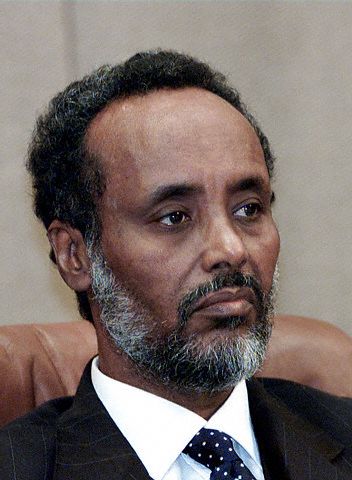- Abdiqasim Salad Hassan
Infobox_President | name=Abdiqasim Salad Hassan
عبدي قاسم صلاد حسن
nationality= Somali

order=7thPresident of Somalia
term_start=August 27, 2000
term_end=October 14, 2004
predecessor=Hussein Mohamed Farrah
successor=Abdullahi Yusuf Ahmed
birth_date=1941
birth_place=
dead=alive
death_date=
death_place=
spouse=
party=
religion=Islam
vicepresident=Abdiqasim Salad Hassan ( _so. "Cabdiqaasim Salaad Xasan", [With various transliterations into English, "e.g." Abdiqaasim Salaad Hassan, Abdi Qaasim, etc.] _ar. عبدي قاسم صلاد حسن), born in 1941, is a prominent Somali politician. Having served as president-in-exile from 2001-2004 (based in
Djibouti ), as of late 2006, he has no official role in theTransitional Federal Government . Previously, Hassan served as an Interior and Finance Minister in the government ofSiad Barre before its eventual collapse in 1991. He is from theHabr Gedir sub-clan of theHawiye centered inMogadishu .Hassan has a brother named
Abdi Salad Hassan who is also active in Somali politics.Career Synopsis
Service in the Barre government
Hassan has held several important positions in the Somali government, most notably as Barre's last Interior Minister. As such, he was simultaneously responsible for all internal security agencies including the National Security Service (NSS), the Investigative Department of the
Somali Revolutionary Socialist Party , the police, and the Deputy Prime Ministership.During his tenure, Hassan presided over several controversial actions, including severe crackdowns and aerial bombings in
Hargeisa andBerbera , during which large numbers of civilians disappeared and are believed to have been tortured and killed. [cite web
title = Human rights in Somaliland: Awareness and action
author = Pippa Hoyland, in cooperation withAmnesty International
date = 1999-09-01
url = http://web.amnesty.org/library/Index/ENGAFR520011999?open&of=ENG-2AF] After Barre's ouster in 1991, he fled toCairo .Post-1991
After 1991, Hassan's government controlled parts of the Somali capital, Mogadishu, with the rest of the country being under the control of various
warlord s.Shortly before the mandate of the Transitional National Government expired in August 2003, Hassan withdrew from talks aimed at forming a new government. Prime Minister
Hassan Abshir Farah accused him of trying to make the talks fail to extend his time in office, resulting in the Prime Minister's dismissal by Hassan. However, Hassan pledged to step aside to make way for a constitutionally-elected leader. Although he was a candidate for the presidency of the new national unity government, Hassan was not among the three candidates who passed the first round of voting. He left office peacefully several days after the election.Post-2000
In 2001, Hassan won elections to become the seventh President of Somalia. For the following three years, he lived and worked in exile while still assuming leadership of the country, as Somalia was too unsafe for him to live in.
Since losing the presidential elections of 2004 to
Abdullahi Yusuf Ahmed , Hassan has rallied for a safer Somalia. He takes part in numerous events in and around Somalia where he talks to his fellow countrymen about how they can change their nation for the better.He now spends his time between Somalia, Egypt and Kenya.
See also
*
List of national leaders References
Wikimedia Foundation. 2010.
